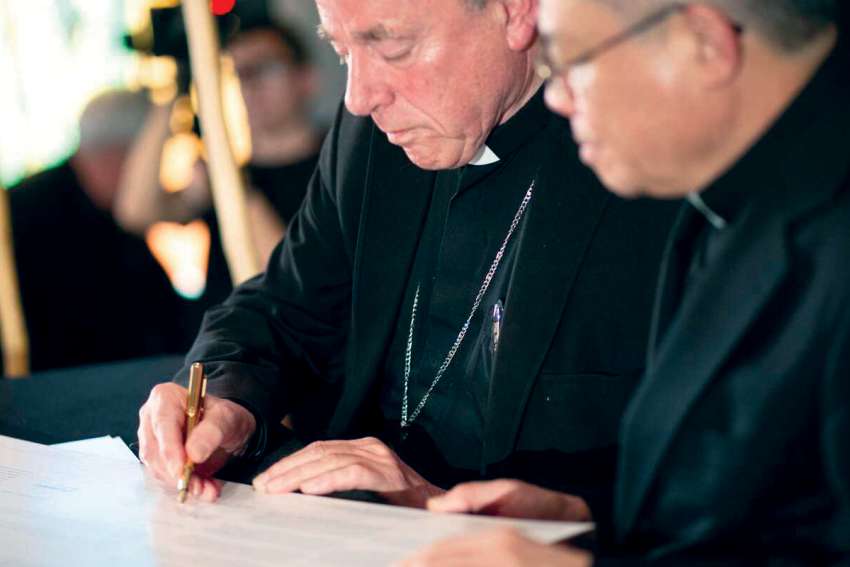Indian residential scho0ls operated for more than a century, and the lasting damage they created is enormous. The reconciliation we seek must be based on truth but also on trust. Trust develops slowly. Indeed, the revelations through the TRC process predictably enflamed the hurt and animosity which survivors and relatives of residential school students experience.
Two years ago, an aging Pope Francis came to Canada and apologized in detail for the harm done to those who attended the schools and to Indigenous cultures. His presence and words fulfilled one of the 94 calls to action in the TRC report.
A year earlier, research at the site of the former Kamloops Indian Residential School, one of the largest schools, found about 200 anomalies in the ground, which might be unmarked graves of former students. In the minds of many “might be” quickly became “are.” Although no bodies have been found, it was quickly assumed that there were in fact 200 unmarked graves of former students. It was a plausible assumption but is still not a proven fact.
On June 21, National Indigenous Peoples Day, the Tk’emlúps Te Secwépemc Nation, the Vancouver Archdiocese and the Kamloops Diocese released the text of a covenant among the three groups. The covenant includes a cautious agreed-upon statement of facts about Catholic teaching regarding Indigenous people, the situation at residential schools in general and the “anomalies” at the Kamloops school.
The statement of facts does not chart new territory. But that is the point. Stating only what is known is crucial to building a foundation for reconciliation. Even what is known is damning to the Church and the federal government. Once again for example, there is the admission that Catholics perpetrated cultural, emotional, physical and sexual abuse at the school. The system itself separated children from their families.
Cautious as it is, the statement of facts offers solid ground for reasoned discussion and concrete action. Those who sincerely want reconciliation should read the document on the website of Canadian Catholic News.
Bishops across Canada have wisely chosen not to respond to the array of allegations made about possible gravesites at residential schools at least until the facts are known. As well, they have refrained from making unsubstantiated comments about the large number of church burnings in recent years. Comments which may turn out to be false can only increase polarization.
The Church has a wealth of experience with forgiveness and the renewal of damaged relationships. However, it is only in recent decades that it has found the courage to admit that its sons and daughters acting in the name of the Church have inflicted grave wounds on the human family. One should not forget the strong resistance which Pope John Paul II faced when he asked for a purification of Catholic consciences for sins against Church unity, the use of violence in defence of truth and acquiescence in the violation of human rights by totalitarian regimes. Defensiveness regarding one’s own sins is no virtue. We must still strive to overcome defensiveness as we seek truth and build trust.
The Kamloops Covenant committed its three parties to several actions “in pursuit of honour, truth, justice, healing and reconciliation.” One is that they work together with transparency to share information about the identities of children who died at residential schools and their circumstances of their deaths.
Another is that the Catholic parties will fund research to provide answers to questions raised about the suspected gravesites near the Kamloops school. Still another is that the three parties will hold a sacred ceremony every Easter season to signify their commitment to truth, justice and reconciliation.
Unfortunately, the Covenant does not include a promise to build personal ties between lay Catholics and residential school survivors. Reconciliation is still being treated as something that takes place among leaders of the involved parties. If reconciliation involves trust and respect, that cannot occur without a meeting of hearts between Indigenous people and the descendants of Catholic settlers.
It may take years to establish the truth of what took place at the Kamloops and other residential schools. In the meantime, relationship building should be a priority. Building friendships is itself time consuming. But one cannot expect trust between peoples to grow without personal outreach. The goal of reconciliation calls us to move beyond our safe enclaves.


